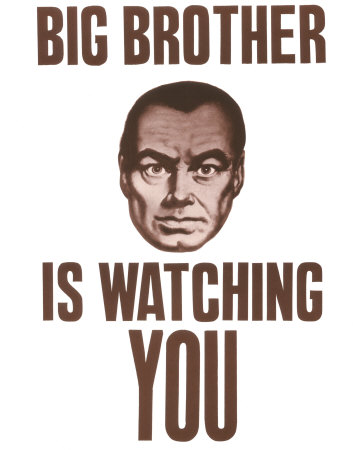“Who controls the past controls the future; who controls the present controls the past.” – Party slogan
 George Orwell’s 1984 |
Some people think of George Orwell’s totalitarian dystopia as a future that never came to pass. The year 1984 has come and gone, they figure, so his vision never manifested; however, Orwell’s cautionary tale remains relevant and may forever remain relevant to our society. In a world where Politicians, Pundits, and Governments struggle for public mindshare with more innovative and devious methods of persuasion, 1984 is more important than ever.
Winston Smith is a solemn, malnourished man. Coffee, bread, cheese, a bit of chocolate, measuring out cigarettes to himself, these are the small pleasures in his life. A telescreen hangs on the wall of his apartment, blaring Party propaganda into his life, barking orders to him, telling him when to exercise, eat, and sleep. It watches and listens to everything he says and does within his filing cabinet of an apartment.
Each flight of the seven flights of stairs Winston climbs to work each day has a poster of an imposing visage and the slogan, “Big Brother is Watching You.” He works in the Records Department of the Ministry of Truth. His job is to rewrite the present into a format acceptable to the Party (read inoffensive to it) for public news. His department rewrites the past and present in a way so as to ensure the Party’s absolute control of the future.
 Big Brother is Watching You |
Winston is fully cognizant of the way the Party works to control everything in his life through disinformation, close scrutiny, and the erosion of knowledge. He knows of more than 30 people who have disappeared and knows it was the Party that made them vanish. “Perhaps a lunatic was simply a minority of one,” he considers, thinking of how different his understanding of the world is from those around him. His insights into the Party’s strategies for absolute control of his mind is a curse, and he behaves in as bland and unassuming manner as possible to hide the machinations of his mind, living in perpetual fear that at any moment the Thought Police will come for him.
Despite his insights, Winston does come under Big Brother’s control at times. The Party organizes “Hate Rallies,” where citizens are gathered and force-fed propaganda. This includes a period of screaming in rage at images of Oceana’s enemies. Winston himself loses his individuality at these events, swept up in the surge of hatred for the foreign threats. Once the rage is expended, the citizens are then allowed feelings of love to fill them as Big Brother’s countenance takes center stage.
An even more frightening concept Orwell introduces in his book is the concept of Newspeak, a Party strategy for absolute thought control of the citizens by stripping them of the language needed to conceptualize resistance. Synonyms and antonyms are banished because they create shades of meaning and nuance of ideas dangerous to the Party’s absolutist slogans and propaganda. The Party abuses the meanings of words it cannot yet erase with contradictory statements such as “War is Peace,” “Freedom is Slavery,” and “Ignorance is Strength,” until they lose all meaning in the citizens’ minds and may finally be eliminated. We see the struggle over language and meaning permeating our modern political discourse today.
The true relevance of the year 1984 in Orwell’s fatalistic vision has nothing to do with an actual timeline, but with the total control the government has over its citizens perceptions. The fictitious war wages perpetually. It always has and it always will, alternating between victory and defeat to give the citizens of Oceana cycles of joy and pain. Through generations, the Party eliminates all words and with them the capability for abstract thought in the populace.
In Oceana, where the citizens are walking dead, rendered unconscious by the Party’s absolute control, it is always the year 1984.